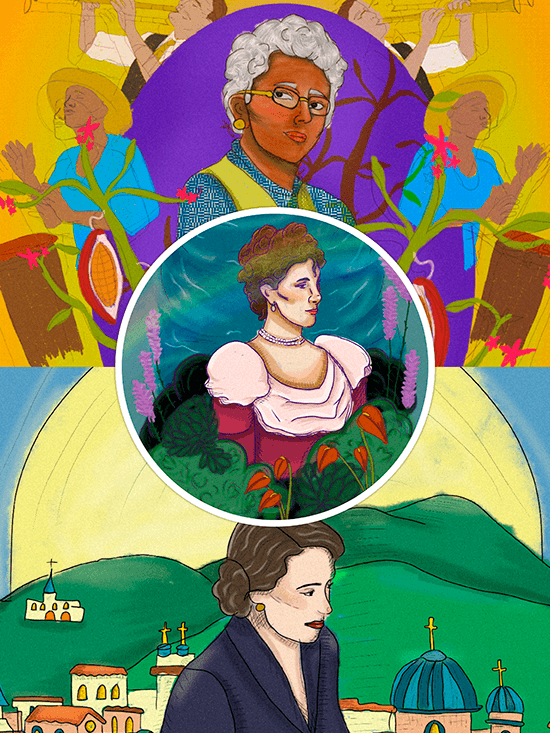Conversación
Extracanónicas
Publicar y traducir
autoras colombianas
—13 de marzo de 2024—

Teresa Martínez de Varela,
Agripina Montes del Valle
y Elisa Mújica.
* * *
Ver grabación del evento:
YouTube.com/CasaMuseoOtraparte
* * *
Crisopeya es una revista de Arte y Literatura de circulación digital y publicación mensual. En nuestras páginas constantemente nos estamos preguntando sobre la creación artística y literaria de nuestros días. Cómo se está (re)creando la realidad. Somos un espacio de encuentro diverso y plural para poner en tensión los discursos que heredamos y los discursos que construimos: los discursos que nos anclan al mundo. En nuestras páginas se puede encontrar un contenido amplio para satisfacer cada urgencia humana: pintura en acuarela, al óleo, digital, dibujo a pastel o grafito, fotografía, escultura; cuento, microcuento, poesía, dramaturgia, reseñas, ensayos, traducción, y más. Textos en español, francés, inglés, alemán, italiano y portugués. Autores de todo el mundo panhispánico y de otras comunidades lingüísticas. Crisopeya es una transformación y, sobre todo un proceso.
El equipo de Crisopeya está integrado por personas que se dedican a la literatura, al arte y a todas sus manifestaciones con pasión. Nos encontramos en la fe transformadora de las artes. Los perfiles varían entre personas que escriben, traducen, editan, publican, ilustran, y tanto más.
«Extracanónicas» es un proyecto enfocado en la recuperación y difusión de obras de autoras colombianas relegadas al olvido. Desafiando el canon literario, a través de la traducción, Crisopeya se dedica a preservar y ampliar el legado de estas excepcionales literatas. Reflexionemos sobre la importancia de desafiar el silencio, rescatar narrativas ocultas y enaltecer la riqueza literaria que merece reconocimiento. Escuchemos las voces atemporales de magníficas autoras que el canon no nos deja escuchar.
Presentación a cargo del
Comité Editorial Revista Crisopeya.
* * *

* * *
Las dos rosas
~ Agripina Montes del Valle ~
I
—¡Triste suerte, Margarita!, decía Rosa a su amiga, reclinadas ambas al antepecho del balcón.
—¿Cuál?
—La de las flores.
—¿Triste? ¡Qué locura! Te equivocas.
—¿Quisieras ser como esos efímeros seres que, viniendo a la vida al primer albor de la mañana, y pereciendo al último rayo de sol, tienen por cuna y por sepulcro un rayo de la celeste esfera, mandado por Dios?
—¡Las flores! ¿No las vemos columpiarse al soplo del ambiente, sirviendo de gala al jardín, de imán a la mariposa, de encanto a las aves, de inspiración al poeta y de placer a todos? Desde el monarca orgulloso hasta el humilde pechero, y desde la opulenta heredera hasta la sencilla campesina, no hay un solo ser en el mundo que niegue a las flores un culto apasionado. Si no, contempla la casa del Señor N: Desde la verja puede admirarse su rico jardín, donde a la sombra de los álamos y de los sauces de Babilonia, ostentan los rosales sus variadas flores al lado del tulipán, del clavel y la camelia, la azucena y el jazmín. Bien se ve que a pesar de sus multiplicadas atenciones, roba un instante a sus importantes negocios, para extasiarse en esas reinas de la naturaleza; y estoy segura que no cambiaría un botón de sus flores por un billete de banco.
»Mira como por la ventana de María, tu modista, asoma sus blancos capullos la siempre modesta violeta. En una tosca jarra de barro cultiva la flor que más le agrada, y alegra su existencia contemplándola.
»¿Recuerdas haber visto en la choza del labriego José unas pocas pero vistosas flores, que él mismo regaba antes de empezar sus tareas ordinarias?
»Este, con sus flores colocadas con intachable simetría y exactitud matemática; esta otra, con la matita que crece al pie de su ventana, y aquel con sus amapolas y buenas tardes diseminadas acá y allá, dejan comprender su amor a las flores en igual grado; solo que el rico gasta en cultivarlas cuantiosas sumas, y los pobres se contentan con lo que sus recursos les permiten.
—Eso no importa, siempre mueren, lo mismo las rosas del Señor N. como las violetas de María y las amapolas de José; y cuando sus pétalos caen marchitos, ni la dama en cuyo seno lucieron va a recogerlos, ni la brisa, que con ellos jugaba, se detiene para no esparcirlos. Por eso juzgo triste su destino.
—Pues yo pienso al contrario. Brilla más la hermosura de una flor cualquiera que dura un día, que la de la mujer más bella. Su reinado es más corto, pero más brillante.
»Yo quisiera ser así. Atraer hacia mí las miradas de la multitud, ser proclamada reina sin rival de la hermosura, así en el baile como en el paseo, tanto de noche como de día; y cuando surcado mi rostro por las arrugas, retirada por los años del bullicio del mundo, no haya un adorador que se entusiasme con mi recuerdo, ni una amiga que me jure amistad sin límites, los recuerdos llenarán el vacío de mi existencia, y aun así seré feliz.
—Mentira, Margarita, pues no puede haber placer en el olvido.
»Reímos ahora, mirando las rosas blancas que adornan nuestro cabello, y no recordamos al arrojarlas por la noche, para tomar un tocado de baile, que así es la vida humana. Al tocar nuestra planta el dintel del sepulcro, al decir adiós a los seres que más amamos en la vida, somos olvidadas por esos mismos seres con la misma facilidad que lo serán esas flores por nosotras; sin que la muerte, de la cual nos burlamos hoy, creyéndola esclava de nuestras gracias y juventud, detenga su guadaña destructora ante el hilo de nuestra existencia.
»Nuestros nombres son emblemáticos. Tú, Margarita, estás revestida, en apariencia, del poder suficiente para resistir los rayos del sol, sin que su calor te queme ni descolore. Yo, Rosa, proclamada Reina, inclino mi tallo al soplo ligero del viento, y cambiaré el blanco color de mis pétalos por unas hojas secas manchadas de lodo, que serán polvo mañana. Tan fácilmente pierden su brillo al marchitarse la margarita y la rosa, las bellas y las feas, las ricas como las pobres; y juntas, hacinadas en ruidoso remolino, rodaremos de trono a la huesa, dadas de mano con la desgracia y envueltas en el sudario del olvido.
—¡Lúgubres ocurrencias! Bien pensado, no mereces tu nombre. Si crees que es nuestro destino el que acabas de pintarme ¡sea! Deja a la brisa y al tiempo el trabajo de deshojar nuestra corola.
Ambas amigas se encaminaron al salón donde las esperaba una animada tertulia.
II
Ved ese féretro.
En él yace blanca, más blanca y pálida que las rosas que coronaban y coronan aún su frente, la bella, la poética y pensadora Rosa.
El ángel de la meditación y el sentimiento bajaron a la tumba. ¡Su profecía está cumplida!
Ella, flor que enriquecía la sociedad con las galas de su persona y el perfume de su virtud, ha sido tronchada de su tallo por el destino airado; esas flores con que, por sarcasmo, está adornada, fueron también arrancadas por una mano cruel, y se marchitarán en un sepulcro sobre las sienes de una vírgen, aunque no las regará el viento.
En cambio, todas las mañanas brotarán nuevas rosas del rosal madre, y natura vestirá nuevas galas; pero la madre desconsolada de Rosa, ¡ay!, no la verá jamás.
Su último suspiro voló confundido con el aroma de su corona.
Mañana, la misma Margarita quizás olvidará a su amiga, como ella, un día no lejano, se lo predijo.
Pero ¡qué digo! ¿En este mismo momento no se dibujan sonrisas en algunos labios amigos?
¿Quién te reveló el porvenir que tan claramente contemplaste, pobre niña?
¡Rosa, descansa en paz !…
¿Y Margarita?
Como la flor de quien tomó su nombre, gustó tanto del sol, que poco a poco ha perdido su color, y ya inclina, lánguida, su tallo hacia la tierra.
Te burlabas del destino, y hélo aquí que llama a tu puerta. Eres una flor, y pronto seguirás el camino de las flores.
III
¡Cuántas que no son flores, como esas Rosas terminan!
Pero no.
Mujeres y flores, somos hermanas.
Dejad a la brisa que quite sus pétalos, y al tiempo que mate sus ilusiones, ¡que arrebaten sus perfumes!
De las flores buscad su aroma…; ¡en el cielo!
De las mujeres el alma… ¡en el trono de Dios!
Enero-1873.
* * *
The Two Roses
~ Agripina Montes del Valle ~
translated into English
by Diana Andrade
I
—It’s a sad fate, Daisy! Rose said to her friend. Both were reclining on the guardrail of the balcony.
—Whose?
—That of flowers.
—Sad? That’s madness! You are wrong.
—Would you want to be like those ephemeral beings who, because they are born at dawn, then die with the last ray of sunshine, only have a ray from the celestial orb, sent by God, as both cradle and grave?
—Flowers! Don’t we see them swinging to the breeze of the environment, acting as embellishment to the garden, magnet to the butterfly, charm to the birds, inspiration to the poet, and a source of pleasure to everyone else? From the proud king to the humble plebeian, and from the opulent heiress to the simple peasant, there is no single being in the world who doesn’t worship flowers with passion. If you doubt me, gaze upon Mr. N.’s house. From the fence, you can admire his luxurious garden, where, in the shade of the poplar tree and the weeping willows, the rose bushes flaunt their varied flowers next to the tulip, the carnation and the camellia, the lily and the jasmine. It is obvious that despite his multiple occupations, he always steals a second from his important business to lose himself in those queens of nature, and I am sure he wouldn’t exchange one of his buds for a banknote.
»Observe how the white buds of the modest violet peer through your seamstress María’s window. She grows the flower she loves the most in a rough clay vase and she enlivens her existence by contemplating it.
»Do you remember seeing, in José the farmer’s hut, a few but lively flowers which he watered himself before commencing his ordinary tasks?
»This one here, his flowers displayed with irreproachable symmetry and mathematical precision; that one there, her small plant growing on her windowsill; and that one over there, his poppies and four o’clock flowers scattered around —they all demonstrate their love of flowers in equal measure, except for the fact that the rich spend hefty sums cultivating them, whereas the poor content themselves with whatever their resources allow.
—That doesn’t matter, they all die —Mr. N.’s roses, María’s violets, and José’s poppies—, and when their wilted petals fall, neither the lady in whose bosom they shined will collect them nor the breeze who played with them will stop to spread them. For that, I judge their fate sad.
—Well, I think the opposite is true. The beauty of any dayflower is shinier than that of the most beautiful woman. Her reign is shorter but brighter.
»I would like such life —draw the multitude’s gaze towards me, be acknowledged as a queen whose beauty has no rival— whether dancing or strolling, during the day or at night—, and then, when my face is crossed by wrinkles, when age forces me to withdraw from the noise of the world, when no admirer who feels joyful at my memory remains, no girlfriend to promise me boundless friendship, then memories will fill the gap of my existence, and even then I will be happy.
—That’s a lie, Daisy, for there can be no happiness in oblivion.
»We laugh now, looking at the white roses adorning our hair, but tonight when we dispose of them, to take the example of an anadem, we will fail to remember that human life is the same. As soon as the soles of our feet touch the threshold of the grave, as soon as we say farewell to those whom we love the most, we will be forgotten by them with the same ease that those flowers were forgotten by us. Death, who we mock today, believing her enslaved to our charm and youth, will not halt her destructive scythe before the thread of our existence.
»Our names are emblematic. You, Daisy, are invested with, at least in appearance, enough power to resist the sun’s rays so that its heat doesn’t burn you or discolor you. As for me, Rose, proclaimed Queen, my stem bends to the subtle blow of the wind and my white petals will soon become dried leaves, stained with mud, which will then turn into dust. The daisy and the rose lose their shine just as easily, as do beautiful women and plain ones, rich and poor. Together we will roll from the throne to the grave, cramped in a noisy whirlwind, holding hands with misfortune, and wrapped in the shroud of oblivion.
—Morbid ideas! You don’t deserve your name. If you think our destiny is what you just described, let it be! Let time and the wind be in charge of pulling the petals off our heads.
Both friends walked towards the salon where an animated gathering awaited them.
II
Look at that coffin.
Therein lies the beautiful, the poetic, Rose the thinker. She is whiter and paler than the roses that used to —and still do— crown her head.
The angel of reflection and passion has descended to her grave. Her prophecy has been fulfilled!
She, a flower who enriched society with her charm and the perfume of her virtue, has been pruned off her stem by an angry fate. The flowers with which she is sarcastically adorned were also plucked by a cruel hand, and they will wilt in a grave over the temples of a virgin even though the wind will not water them.
In contrast, new flowers will blossom every morning in the mother rose bush, and mother nature will wear new regalia, but Rose’s inconsolable mother —oh!— will never see her.
Her last breath flew away muddled with the perfume of her crown.
Tomorrow, Daisy herself might forget her friend, just like Rose, not long ago, predicted.
But what am I saying? Aren’t smiles appearing on friendly lips at this very moment?
Who revealed to you the future you so clearly discerned, poor girl?
Rose, rest in peace!
And Daisy?
Just like the flower whose name she took, she enjoyed the sun so much that she lost her color little by little, and her stem already bends, languid, towards the earth.
You mocked fate and here it is, knocking at your door. You are a flower and a flower’s path you shall soon follow.
III
So many, although they are not flowers, end up like those Roses.
But no.
Women and flowers, we are sisters.
Let the wind remove their petals and let time kill their illusions. Let them seize their perfume!
Search for the smell of flowers… in heaven!
Search for the soul of women… on God’s throne!
January-1873.
Fuente:
Crisopeya, n.º 3, año iv, 15 de noviembre de 2023, pp. 82-91.


